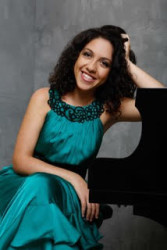 Italy Bach: Beatrice Rana (piano), Sala Sinopoli at the Accademia Nazionale di Santa Cecilia, Rome, 15.3.2017. (JB)
Italy Bach: Beatrice Rana (piano), Sala Sinopoli at the Accademia Nazionale di Santa Cecilia, Rome, 15.3.2017. (JB)

Bach: The Goldberg Variations
Here is Beatrice Rana. I first heard her age seventeen, playing romantic repertoire at Eilssò Virsaladze’s Sermoneta Master-class. She is now twenty-three. Already at that first hearing, there was an inexplicable maturity in her playing. A strikingly beautiful southern-belle, she gets younger with every year that passes. But the most remarkable thing of all is that this eternal youthfulness is accompanied by an unbelievably active maturity of musical understanding, which to date has shown no diminishing: quite the contrary. She has to be one of those rare gifts of the gods.
That “religious” comment fits well with her birth. She comes from pianist parents in Lecce, the Baroque city of Puglia. (See Sacheverell Sitwell’s writings and photos if you want to know something about the breath-taking beauty of Lecce.) Her parents sent her to the Conservatory of Monopoly, where she studied for eight years with Benedetto Lupo (himself a fine pianist and, as evidenced here, a great teacher). Maestro Lupo suggested she might try other teachers after she was launched; and so she did. But these teachers were not getting out of her what Lupo had. So she has returned to him; he now teaches in Rome, including Masterclasses at Santa Cecilia.
In the meantime, she had won the Montreal International Competition at the age of eighteen (the youngest ever winner and the only Italian) which launched a North American tour and her career on that continent. For good measure, she also won the Silver Medal at the 2015 Van Cliburn competition. Add to this recording of Tchaikovsky and Prokofiev concertos for Warner, with Antonio Pappano.
Tonight’s programme was the Goldberg Variations, already recorded for Warner Classics and performed worldwide, including London’s Wigmore Hall.
Benedetto Lupo encouraged Beatrice to play the Variations when she was very young. Then she left them. Three years ago she returned to the piece. In an interesting programme interview, the distinguished critic, Andrea Penna, asked her what the difference was between her youthful study and the recent acquaintance. She replied that her recent experiences with audiences across the world had changed, and continues to change, the way she plays. She spoke of the very real, but unspoken communication that exists between her audiences and her playing. This sounds very much like Rubinstein, who famously said in a BBC TV interview with Bernard Levin, that for him (Rubinstein) every performance was a recreation of the music for a particular moment in a particular time and place. For Rubinstein, without that specificity (where eternity meets the actual, so to speak) there could be no music making worthy of the name.
This takes us straight into Bach’s spirituality. That word has been so overused as to become almost meaningless. But I can think of no other word which would be right here. Beatrice, in the Penna interview, says that the architecture and mathematical structure of the Variations, wholesome, noble, lofty and inspired of themselves, for her, are not the essence of the work. That essence is in the pianist’s exploration of the music’s fathomless depths.
And what an explorer Beatrice Rana turns out to be. What a journey she takes the audience on. This is what I ask of every concert I attend. I rarely get it: to be taken through music I thought I knew and to be surprised through the performer that I didn’t. Never has a Santa Cecilia audience put itself in the hands of a recitalist so completely. We held our breaths as she brought this music alive as never before.
Shockingly and most unexpectedly, the one word, which for me, would describe her performance is steely: it’s almost as though she renounces Bach in order to embrace him. Her forte passages are arrestingly authoritative, often with a dismissive touch too, though always infused with purposefulness. There are nods toward the two manual clavichord (for which the work was written); these brought about by contrasting dynamics of answering phrases. But never for a moment does she allow us to forget she is playing on a modern Steinway. She warns in the interview of the pedals being more your enemy than your friend, if overused. Maximum discretion is her watchword here.
Then there are the pianissimi. These are steely too. Don’t ask me how she does this. How can a pianist manage to be assertive and hushed in the same stroke? Beatrice Rana does. Imbuing the music with contradictory sounds is her art.
At the end of an hour and twenty minutes I was unable to join in the thunderous applause. For me this had been an experience of being more in a cathedral than a concert hall: the cathedral of Johann Sebastian Bach with the Reverend Beatrice Rana officiating. I cannot help feeling the composer would have approved of my respectful silence. I haven’t heard her recording of the Goldberg Variations either. Nor will I be listening to it. I want to go on living with the treasured aural memory which no one will ever be able to take away from me.
Jack Buckley
